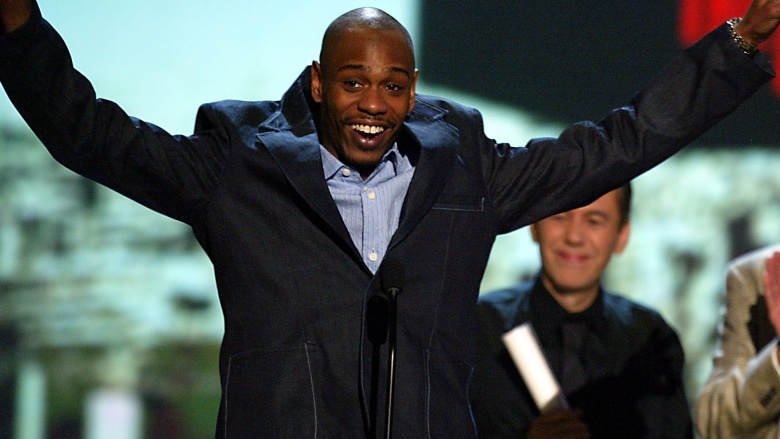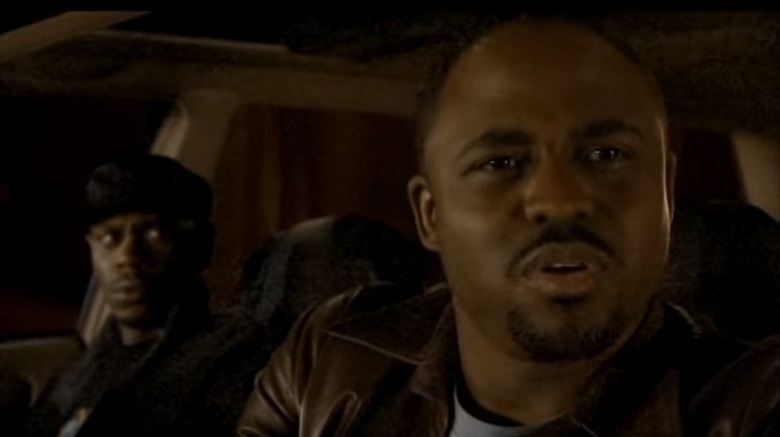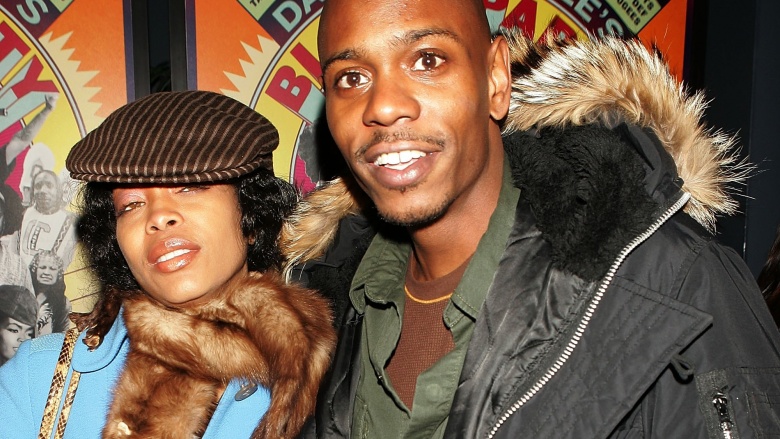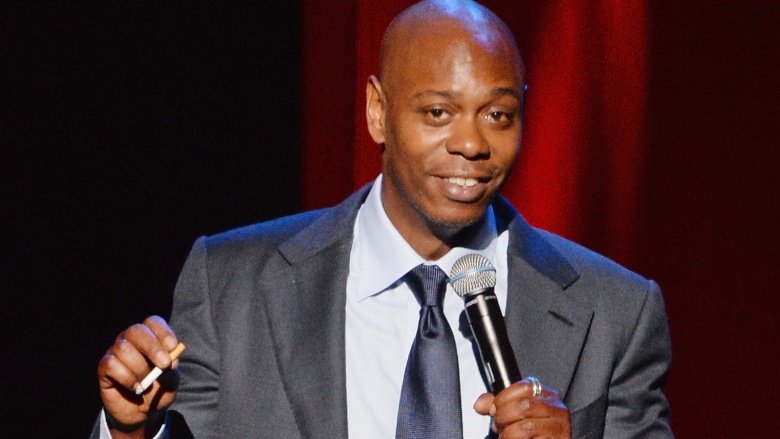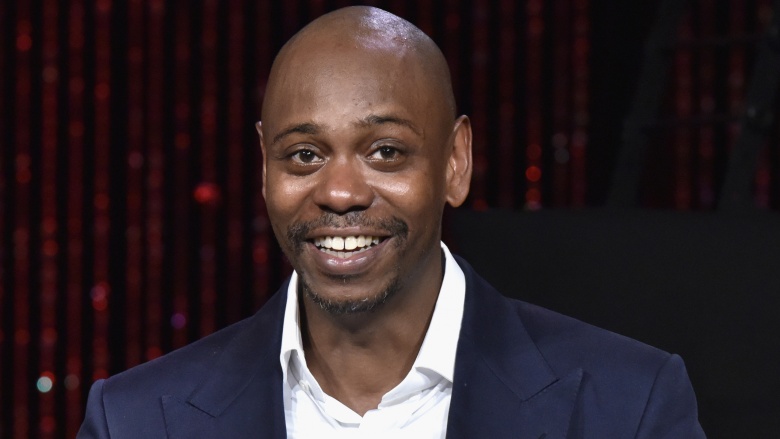Why Dave Chappelle Is More Important Than You Think
Chappelle's Show, the Comedy Central hit co-created by comedians Neal Brennan and Dave Chappelle, was an utterly unique television phenomenon. Its first season remains among the highest-selling DVD sets of all time, and even more than ten years after going off the air, it's still eminently watchable, quotable, and hilarious. Everyone has their favorite lines and exchanges—"Some people say cucumbers taste better pickled." "What?" "Huh?" But why did Dave Chappelle resonate in the first place? And why, after all these years, do we still need him more than ever?
He's a master at combining high and low culture
Has anybody so enthusiastic about diarrhea humor ever been called a "genius" as often as Dave Chappelle? Mozart, maybe, but the topic rarely came up in his work. (Rarely.) Call it the old vegetables-in-the-dessert trick. In a single stand-up set, he can go from mudbutt into dangerous neighborhoods, highlight the injustice of our legal system, attack George Bush for starting an unjust war, and then leave the planet with three cloned triplets, a space alien, and the cure for AIDS. You almost don't realize you're learning something.
He's not scared to show us his flaws
The hardest part of being relatable is letting yourself be a little vulnerable. You have to demonstrate that you're not above the jokes you're making, and Chappelle is a master of reminding us that he's just another guy—wildly successful, but just as insecure as anybody else. He often turns his humor against himself, joking about a passionate love of internet porn, or devoting a whole episode of his show to sketches that didn't work. Or the famous Wayne Brady mea culpa, which produced one of the most surreal and outstandingly funny sketches you're ever likely to see.
After making a particularly scathing joke as the prophet Negrodamus at the more clean-cut comedian's expense (say it with me, nice and slow: "white people love Wayne Brady because he makes Bryant Gumbel look like Malcolm X,") Chappelle offered an apology of sorts with an episode-spanning clapback that found Brady on a Training Day-esque crime spree with Dave completely sidelined as his friend, fellow actor, and terrified hostage. It's funnier than the joke that sparked it by a country mile, and proves Chappelle's the rare person in show business who'd cede that much ground to someone they'd insulted—though perhaps when it comes to a machine-gun armed, PCP-slinging Wayne Brady, the best course of action is to just give him what he wants.
He's a hip-hop ambassador
The show's relationship with music brought some of the all-time greats into homes of millions of Americans, from the otherworldly groove of Worldwide Undergound-era Erykah Badu to the titanic duo of Yasiin Bey (then Mos Def) and Talib Kweli in Black Star. But it's his movie, the Michel Gondry-directed Dave Chappelle's Block Party, that really proves his hip-hop and soul bona fides.
At the time, the documentary must have struck many as a strange watch, coming on the heels of two of the funniest seasons in the history of TV; light on jokes, it takes viewers inside the days leading up to a free block party Dave threw on the streets of New York. Its sense of inclusiveness is heartwarming, and joy radiates from every frame; there's hardly a scene in which Chappelle isn't lighting up the room with a smile, and his excitement is infectious. "This is the concert I've always wanted to see," he says of the lineup, an absolute murderer's row that includes Dead Prez, Kanye West, Jill Scott, a low-key John Legend, Cody Chesnutt, and Questlove of the Roots. The movie portrays him as a fan with access, putting together the show of a lifetime with artists he's grown up admiring who've become his friends in show business.
Filming the concert was a gift to all of us who couldn't make it to New York that day. It's the rare concert film that feels truly special—more than just good tunes and good vibes, the show goes on in the pouring rain, in front of an audience full of people who otherwise might not be able to afford such a fantastic lineup. Referring to it as a mere concert documentary does a disservice to its underlying narrative of human connectivity, resilience, and one love. Oh, and there's some jokes, too.
He's not scared to go off-the-cuff
Dave famously got his start in stand-up at a young age, climbing onstage at age 14 and just riffing on whatever. Which is not to say he doesn't have meticulously constructed jokes, but rather that he's not scared to let them wait between bits of stream-of-consciousness comedy and audience interaction. Behind the scenes of his TV show, it's very obvious at times that he's on stage treading water in a sea of his own sense of humor, throwing out little bits and turns of phrases apropos of nothing just to see if they get a laugh. This sometimes backfires, as attested by the occasional "Crazy Dave Chappelle" reports sparked by the infamous moments when his comedy, shaped by his mood, has turned downright antagonistic.
No one's ever been more frank about race—or as inclusive
You very, very rarely feel like Dave Chappelle is making fun of someone in his comedy. (Okay, admittedly, Condoleeza Rice got it pretty hard.) But if there's anything about Chappelle's comedy that has true importance to society—whether it's what he accomplished with co-creator Neal Brennan on his show or aired out on his own onstage—it's the frank way in which he engages in talk about race.
Chappelle doesn't pretend we don't have differences, but his M.O. isn't in exploiting those differences as much as it is bridging the gap in a tongue-in-cheek way. Take, for example, the classic Chappelle's Show sketch "I Know Black People," in which nonblack cops, comedy writers, grocery store owners and professors are put to the test—and mostly end up revealing the tellingly off-kilter things they think they know about their black neighbors. It's an irreverent exploration of American society's greatest wound, and one that many comedians wouldn't dare touch with a ten-foot-pole. But Chappelle leans into the skid. It's a step beyond "white people are like this, black people are like this," accepting our differences as a baseline and exploring their inherent humor.
The Chappelle's Show sketch "Trading Spouses" offers another example of this fearlessly honest humor, depicting white Todd Jacobson as he alienates his temporary black family with his rule-following, gravely boring, weirdly sexually desperate nature—while black Leonard Washington brings some street reality to the suburbs with his hardened paranoia, cigarette dangling off his lips, wondering aloud without apology why he don't smell no dinner cooking. "White people don't use washcloths," he discovers, to amazement. Meanwhile, white viewers nationwide tilted their heads to the joke, thinking, "That's a thing?"
It's these little observations, surface-funny but deeply felt, that truly do a service to society at large. We're different, but we're not that different, and none of us are too good to be the butt of a great joke. It's that irreverent approach that brings us closer, and it's why—even all these years after he edged out of the spotlight—we're still waiting for Dave Chappelle.

